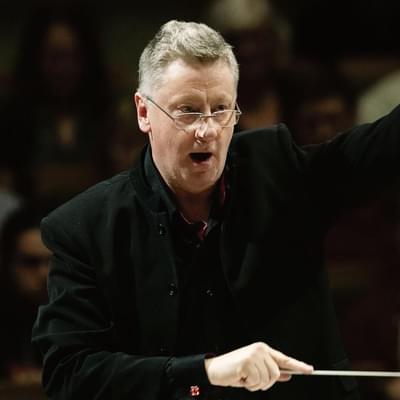Viennese New Year

Programme to include...
- Strauss, Gypsy Baron March
- Strauss, Ich Liebe Dich No.2
- Lehár, Land of Smiles Overture
- Strauss, Elyen A Magyar Polka
- Strauss, Morgen
- Strauss, Ich Trage Meine Minne
- Korngold, Straussiana
- Lehár, Gold and Silver Waltzes
- Binge, Fair Frou Frou
- Lehár, Meine Lippen
- Strauss, Romance No.1 in D minor
- Strauss, Pizzicato Polka
- Lehar, Vilja
- Strauss, Blue Danube
Performers

Stephen Bell
Conductor
Francesca Chiejina
Soprano
Introduction
I am so looking forward to kicking off the new year with the City of Birmingham Symphony Orchestra with a dazzling programme of Viennese music.
Some of the music we will perform in this concert has been part of my life for a long time. Strauss’ Morgen is a piece I have lived with longest. Back when I was a student at the University of Michigan, I had the honour of hearing Renée Fleming in concert at the Hill Auditorium, where she sang this song, and I remember distinctly the huge impact Strauss’ Morgen had on me – immediately I wanted to learn and sing it myself! The song came up again in my final year Masters recital at Guildhall School of Music & Drama. Now I am older I actually find it more intimidating to sing, knowing the gravitas of the piece, but as I reflect on how it has developed through my career, I especially look forward to revisiting it once again with the CBSO.
Viennese music in general is quite playful and dramatic at times, making it super fun to perform. Strauss’ Ich Liebe Dich is quite masculine for Strauss’ writing – it is very broad, with a bravado-like orchestration. Lehár’s music is dramatic, but in a different way to Strauss’: Meine Lippen is sung by the character Giuditta and cheekily boasts about her new position as a nightclub dancer. Lehár loves to tell an exaggerated story with his music, making them the trickiest to learn but the most fun to listen to as an audience member!
I am so happy to be back in Birmingham at the start of this new year, performing my debut with the CBSO after many trips here to sing with the Birmingham Opera Company. I hope you enjoy this concert too – it certainly will keep you on your toes!
Francesca Chiejina
Soprano
Programme notes
The perfect pick-me-up for a Sunday afternoon in early January, offering the sparkle of Vienna right here in Birmingham. There’s something incredibly romantic and truly joyful about elegant waltzes, playful polkas and light-hearted operetta. So, let the CBSO whirl you into a new year feeling romanced, revitalised and ready for 2025!
Where the Alps give way to the rolling fields of Central Europe – and where the Europe of wine and song meets the Europe of beer and dance – stands the city of Vienna. It’s a crossroads of Europe, and in its Imperial golden age it was the city of everyone’s dreams, the heart of an empire that stretched from Alpine glaciers to the Ukrainian steppes, and from the lemon-groves of Italy to the bear-infested forests of Bohemia. On the streets of Vienna you might meet Italians, Poles, Czechs and Hungarians; you’d see rabbis from Galicia, Bosnian Muslims in red fezzes, and Romani violinists from the hills of Transylvania.
And when they met, they danced: to racy operettas, polkas that fizzed like champagne, and of course, to dreamy, endlessly seductive waltzes. Viennese music is as colourful – and as multicultural - as the city itself, and in Vienna’s ballrooms and cafés, everyone got a slice of the fun. But this waltzing empire had two halves, and the ancient Kingdom of Hungary was fiercely proud of its own national culture and traditions. From 1867 it demanded that the Austrian Empire should be known as Austria-Hungary.
Heart’s delight
Still, where politicians saw problems, a musical entrepreneur like Johann Strauss II – Vienna’s so-called “waltz king” - saw opportunity. He set his operetta The Gypsy Baron (1885) deep in rural Hungary, and this comedy of love, war and pig farming was a smash in both Vienna and Budapest. The brilliant Entrance March combines the sizzle of Hungarian folksong with the swing and snap of an Austrian military march. It’s Austria-Hungary in a musical nutshell – win: win!
Richard Strauss was no relation to Johann; just his greatest fan (“If only!” was his usual response when people made that perfectly understandable mistake). He was born in Munich, but like Mozart, Beethoven and Brahms he moved to Vienna and swiftly became more Viennese than the Viennese. He even turned his hand to the occasional waltz. His real genius, though, was for super-romantic song, and the title of the passionate Ich liebe dich (I love you) (1898) tells you exactly what to expect.
Franz Lehár was another adopted son of Vienna (his family was Hungarian) though as an army bandmaster’s kid he was at home wherever his father’s regiment was stationed. Vienna was where he made his fortune, though - writing operettas (popular comic operas) that were the blockbuster musicals of their day. The Land of Smiles (1929) is a culture-clash romance: the love story of a handsome Chinese diplomat and the beautiful Lisa – who soon finds that although you can take the girl out of Vienna, you can’t…well, you get the picture. The overture sets the mood and previews the show’s greatest hits. You might recognise one of them by its English name, You Are My Heart’s Delight.
Vienna isn’t Vienna without a dash of Eastern spice, and you can almost taste the paprika in Johann Strauss II’s fiery quick polka, Éljen a Magyar! (Hurray for Hungary!) (1869). Passion was never far from the surface, though it could blossom in the most delicate ways. In Richard Strauss’s song Morgen, written in 1894 as a wedding gift for his wife (a soprano), the singer never actually sings the lovely melody – instead, they seem to caress and embrace it with their voice. The tune of Ich trage meine minne (1896) could almost be a folk song, if only it didn’t get quite so hot under the collar. Once again, it’s all about love…
Far away and long ago…
Music was in the air in Vienna, and once in a generation it produced a miracle like Erich Wolfgang Korngold - one of the most astonishing child prodigies in musical history. He started composing at the age of seven, and cynics whispered that his father Julius, a famous music critic, was the real composer. Julius’s answer was indignant: “If I could write music like that, why would I be a critic?” When the Jewish Korngold family fled the Nazis, Erich found a new career in Hollywood. But he never forgot the Vienna he’d loved – the Vienna of Johann Strauss. In 1953, in Los Angeles, he thought back to his magical boyhood and created Straussiana – a nostalgic medley of melodies by the Strauss family, sprinkled with Korngold’s special brand of orchestral stardust.
A lifetime earlier – in happier days – it was dance music that had given Lehár his big break. The glamorous Princess Pauline von Metternich wasn’t known for understatement, and at her fabulous Gold and Silver Ball in January 1902, the ballroom was decorated with gilded palm trees and the ceiling was studded with golden stars. For music, she took a chance on the young Lehár, inviting him to “write a waltz that will make you famous overnight”. Gold and Silver is the result – a truly sumptuous waltz, in which the melodies themselves seem to drip with jewels.
Of course, Vienna wasn’t the only city of dance – Faire Frou-Frou captures the high-kicking spirit of the Parisian can-can, which is all the more remarkable when you consider that it was written in 1957 by Derby’s very own Ronald Binge (best known to Radio 4 night owls as the composer of Sailing By). Lehár’s imagination roamed far and wide too, and his final operetta Giuditta (1934) is the steamy tale of a flame-haired beauty who leads her lovers to ruin across Italy and North Africa. In this smouldering little number, Giuditta deploys all her charms. She begins in a blaze of Latin passion, but before long she’s gliding into – what else? - a seductive Viennese waltz: Meine Lippen sie küssen so heiss.
Dancing all over the world
Hot stuff: it’s no wonder that Viennese music was in worldwide demand. In the nineteenth century Johann Strauss II took his famous orchestra on tour all over Europe, and for many years they played an annual summer season in the elegant resort of Pavlovsk, near St Petersburg. Strauss knew his audience well, and in 1860, specially for his Russian public, he wrote this soulful Romance for cello, harp and orchestra. Ever the diplomat, he dedicated it to one of his celebrity fans: the beautiful (and wealthy) Georgian princess Caterina Dadiani. He called it Une Pensée – just a “little thought”. What could be simpler? Well, how about the Pizzicato Polka, which Johann co-wrote with his brother Josef in 1869? It does exactly what it says on the tin - the string instruments are plucked (pizzicato) all the way through. Audiences went wild.
And they really went wild for Lehár’s operetta The Merry Widow. Premiered in Vienna in 1905, The Merry Widow was the Hamilton, Wicked and Les Misérables of the Edwardian era, all rolled into one. Before long, it had conquered London and New York too: Lehár was rich, and a Widow-crazy public could buy "Merry Widow" biscuits, hats, salads, shoes, cocktails and cigars. Tunes like Vilja are the reason why - a pretend folksong about a lovesick water-nymph, sung by our millionairess heroine Hanna as she sets her cap at the one man in Paris who isn’t interested in her bank balance. Wait and see - you'll be humming it for days.
But there’s only one way to end a ball in Vienna – with the waltz that’s become the city’s unofficial anthem. “Sadly not by me” scribbled Johannes Brahms on the score of Johann Strauss II’s The Blue Danube (1867). Make no mistake - this music can hold its head up beside Beethoven. Take those opening bars. It’s just a shimmer of violins, and three simple notes on the horn, but within seconds, Strauss has created a world. Feel the back of your neck tingle, and your toes begin to tap – and let the rhythm do the rest.
© Richard Bratby